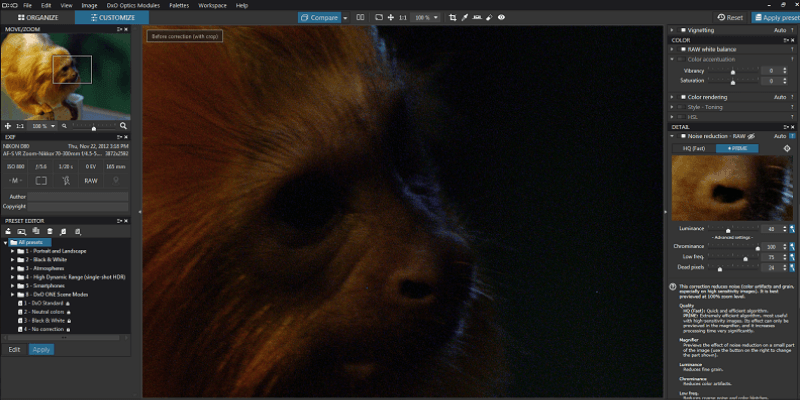

They're not as magical as Lightroom's Upright capability, but they're somewhat easier to use than the manual corrections in Lightroom. ViewPoint has some nice perspective distortion features. Somebody please let me know when this product is ready for prime time. In other words, ViewPoint, presumably using the same correction module as Optics Pro, creates a color cast that is absent in the Optics Pro product.Īt this point, I give up. I ran the same file through DxO Optics Pro and the colors matched those displayed by Lightroom.

Worse yet, ViewPoint, which isn't supposed to apply any corrections except optical ones, altered the colors in my test image.
Dxo optics pro lightroom plugin code#
It certainly couldn't be difficult to code a finite-state machine that would collect the metadata necessary to determine what module to apply from the Lightroom-generated TIFF. It's difficult for me to imagine what the DxO developers were thinking when they designed a product that required this extra step. Which means that for every image, after the ViewPoint plugin has collected the Lightroom TIFF, the user is required to navigate manually back to the original image (it must be the actual file emitted by the camera) in order to apply the DxO module corrections. Even when the camera-lens pair is supported, ViewPoint must collect and parse the metadata from the original image file. It turns out ViewPoint is not designed to read the metadata required to determine what DxO module to apply from the TIFF it receives from the DxO Lightroom plugin. I then tested the product with what I verified in advance was a supported camera-lens combination and it worked. But the diagnostic error message displayed by ViewPoint was at best uninformative and, more accurately, misleading: "File does not contain any valid EXIF data." There is simply no excuse for an application failing to provide meaningful error strings. My prior experiences with the company's customer support operation indicate that there is little or no direct contact between the support reps and the people who actually understand the code.Īfter sending DxO customer support a sample image file (Nikon NEF), I was informed that the camera-lens combination I used does not have a corresponding DxO module in other words, the pair is not currently supported.įair enough, and perhaps I should have checked that before testing DxO Viewpoint's Lightroom plugin. I've provided some additional information for debugging, including sample metadata string dumps from a Lightroom-generated file and the corresponding original Nikon NEF, but have no clue whether it has been forwarded to the DxO development staff. The bottom line, according to the support rep, is that the company is not aware of any problem involving Lightroom compatibility. I've received no response to my follow-up message explaining that navigating to the original file within ViewPoint produces a diagnostic error message that the file does not contain "any valid EXIF data" (see attached). The initial response was that ViewPoint was not designed to read Lightroom-generated TIFFs (which strikes me as, ahem, rather odd for an application that touts its Lightroom compatibility and installs a Lightroom plugin), and that it it needs to parse the metadata in the original raw file for the DxO automated camera-lens correction modules to work.

Well, I've had a lengthy but not very satisfactory exchange of messages with a DxO customer support rep. I'll query their support staff, but in the meantime I wonder if anyone reading this is aware of some LR parameter I need to set, or other magic incantation I need to utter, to supply ViewPoint with the data it needs. I can see all the information ViewPoint should require with a standalone metadata viewer.Īs usual, I couldn't find any useful information on DxO's product-support web pages. However, whenever I launch ViewPoint from LR with a LR-created TIFF, ViewPoint complains that the file "does not contain any valid EXIF data" that ViewPoint can parse to find the camera and lens parameters.Įxcept that it does. (And DxO offers many more lens modules than out-of-the-box LR.) Optics Pro is rather clunky to use as a LR external editor, and it occurred to me that ViewPoint might not only be better suited to the task, but also be an easier tool to use for handling perspective correction than LR's sliders for those images where the new Upright feature doesn't quite do the trick. I've long felt DxO Optics Pro's automated camera/lens modules tend to do a better job of compensating for optical defects than LR's lens correction profiles when both products support the same lens. Has anyone successfully been able to use DxO ViewPoint as a Lightroom 5 plugin?


 0 kommentar(er)
0 kommentar(er)
